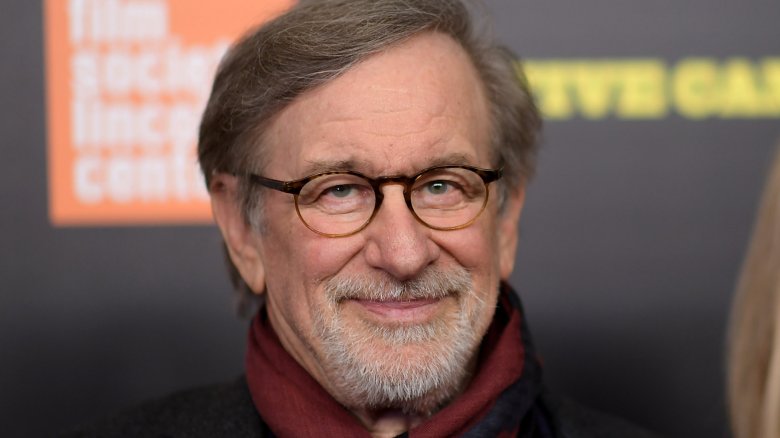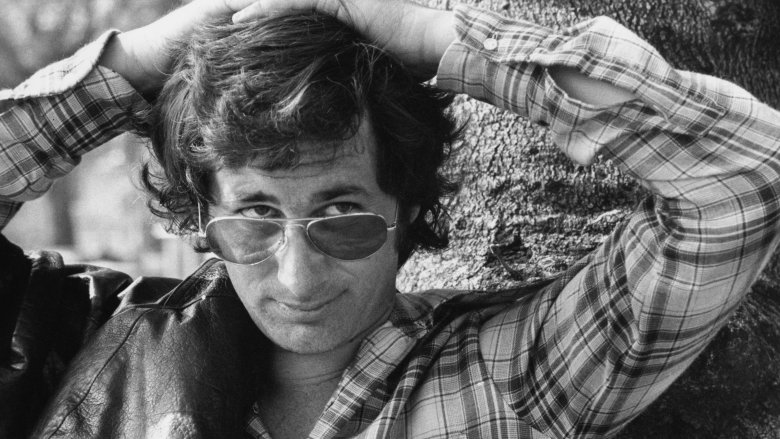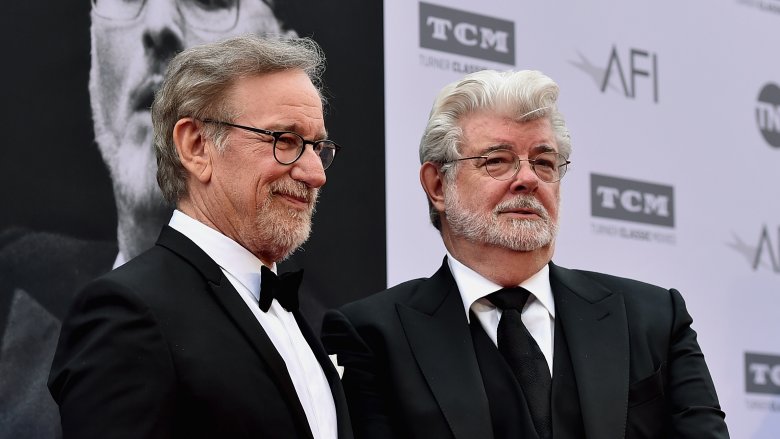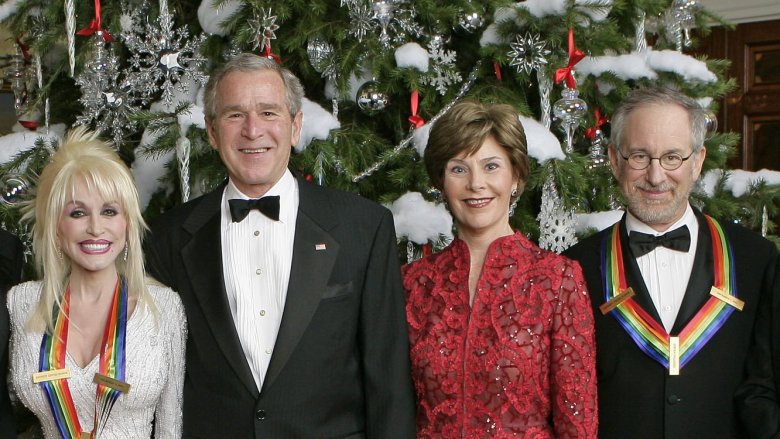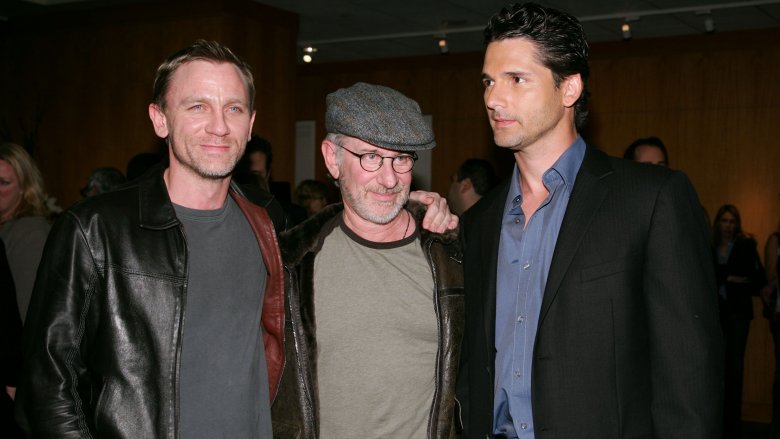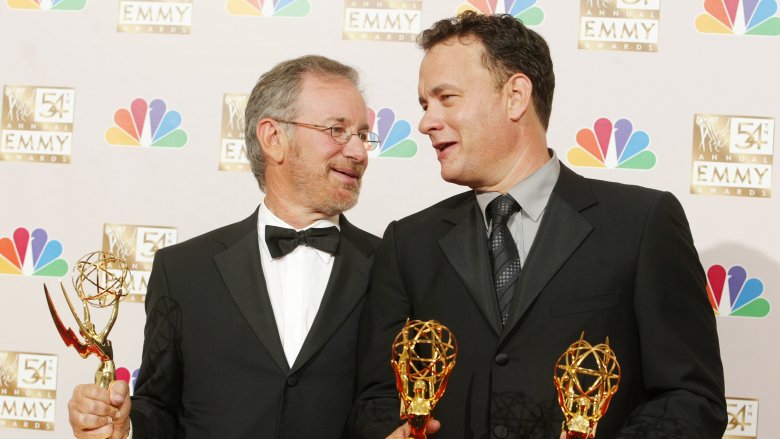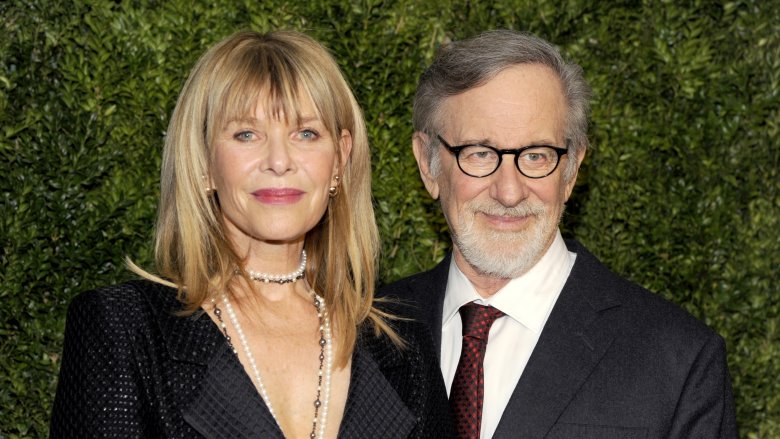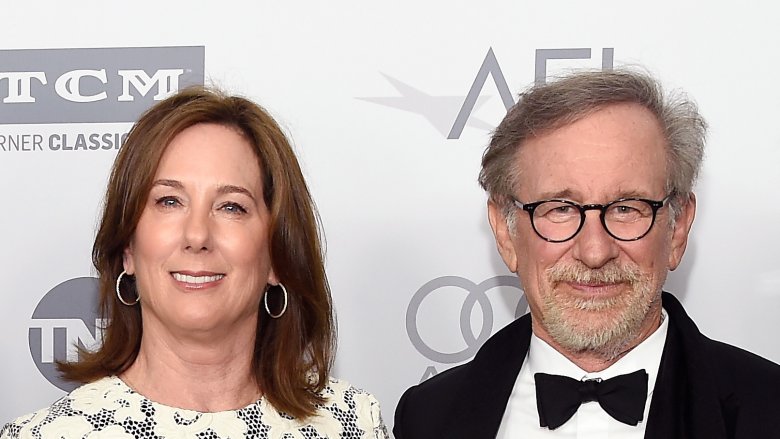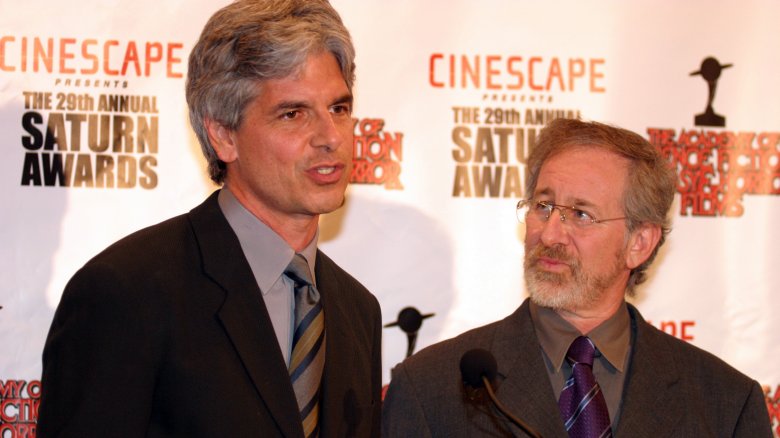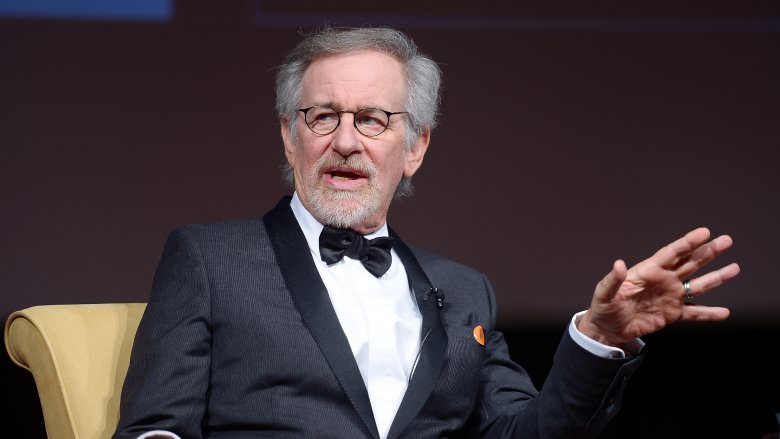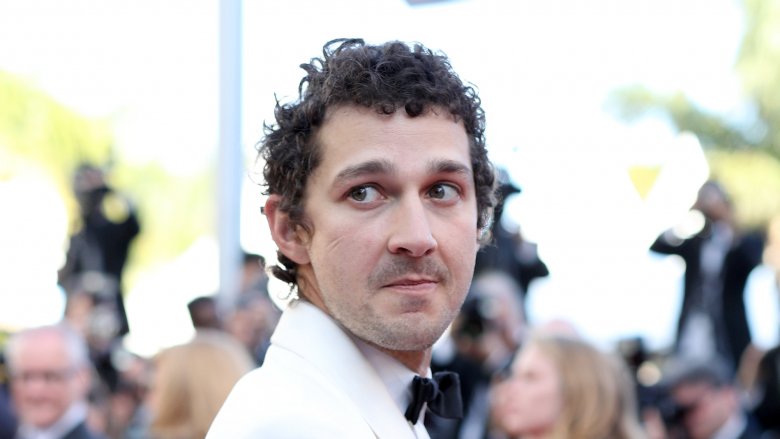Sketchy Things Everyone Just Ignores About Steven Spielberg
Steven Spielberg isn't a name one would automatically associate with controversy, but nobody can make it 40 years in Hollywood without ruffling a few feathers along the way. Though he's recognized as one of the greatest filmmakers to ever work in Tinsel Town, Spielberg's personal reputation isn't as flawless as you'd think. We often see the wholesome, classy parts of the director shining through in his movies, but there's a whole other side to him that Hollywood seems happy to brush under the red carpet. From his questionable treatment of friends and colleagues to the bizarre circumstances surrounding his forgotten prenup, these are the sketchy things everyone just ignores about Spielberg.
The James Bond franchise 'can't afford' him
Spielberg made his first big splash in Hollywood with 1975's Jaws, a movie often credited with pioneering the summer blockbuster. The great white shark thriller opened in 409 theaters and earned $14 million its first week, which might not seem like much by today's standards, but back then it was a considered a colossal haul. Jaws went on to be the first film to ever gross more than $100 million. It made Spielberg one of Hollywood's hottest personalities, but there was one job he couldn't walk into at the time.
Speaking to BBC Radio 2 (via the Independent), the director explained how he asked James Bond producer Albert R. Broccoli to give him the next 007 flick, but Spielberg was turned away. "I called Cubby Broccoli twice, and after Jaws—which was such a huge success—I thought 'Hey, people are giving me final cut now.' So I called up Cubby and offered my services but he didn't think I was right for the part."
Spielberg went on to make Close Encounters of the Third Kind (1977), and after that film also became a massive success, he tried his luck with Bond a second time. Spielberg was rejected again. Years later, the veteran director came across a little embittered by the whole experience, telling the BBC radio show that the Bond ship had sailed. "Now they can't afford me," he said.
He hung his best friend out to dry
Spielberg's friendship with fellow filmmaker George Lucas is well documented, as is their arrangement over the Star Wars royalty rights. According to an interview Spielberg did with Turner Class Movies (via HuffPost), Lucas visited the set of Close Encounters when he was in the process of making Star Wars and was blown away by what a $20 million budget could buy. Believing Spielberg's film would do better than his, Lucas asked for a 2.5 percent stake in Close Encounters in exchange for 2.5 percent of Star Wars. "I think I came out on top in that bet," Spielberg said.
The two went on to famously collaborate on the Indiana Jones movies, with the original '80's trilogy earning them both a load of cash. When they reunited for Indy's fourth adventure in 2008, the box office haul was still good, but unlike previous flicks in the franchise, audience reaction was lukewarm at best. While Spielberg took responsibility for the most ridiculous moment in the movie (Jones surviving a nuclear blast by hiding in a fridge), he basically hung Lucas out to dry over the film's MacGuffin—the alien crystal skull.
"George and I had big arguments about the MacGuffin," Spielberg told Empire. "I didn't want these things to be either aliens or inter-dimensional beings. But I am loyal to my best friend. When he writes a story he believes in—even if I don't believe in it—I'm going to shoot the movie the way George envisaged it."
He backed Bush's war in Iraq
When President George W. Bush announced that he was sending troops to Iraq in 2003, a number of Hollywood residents banded together to oppose the decision.
A public letter to the president from a group called Artists United to Win Without War was signed by a number of A-listers, including Matt Damon, Samuel Jackson, Ethan Hawke, and Uma Thurman. Industry elder statesman Dustin Hoffman also joined the debate. "This war is about what most wars are about: hegemony, money, power and oil," the Rain Man star said during an awards show in London (via ABC News). Some of the biggest voices in Tinsel Town were staunchly against Bush, but Spielberg wasn't one of them.
When the director was quizzed over his loyalties while doing press for Minority Report (2002) in Italy, Spielberg bucked the position established by many of his peers and put his faith in the president. "If Bush, as I believe, has reliable information on the fact that Saddam Hussein is making weapons of mass destruction, then I cannot support [the Iraqi regime]," he said.
He 'humanized demons' in Munich
In 2005, Spielberg brought his passion project, Munich, to the big screen. The film tells the story of the 1972 Munich Olympics massacre and its equally bloody aftermath. Eleven Israeli athletes were slaughtered by Palestinians from the infamous Black September group during an event that was intended to bring nations together.
Spielberg appeared defiant after Munich came away from the award ceremony empty handed. "Here were Jews being murdered on German soil again," he told The Guardian the morning after the Golden Globes. The awarding bodies weren't the only ones who didn't warm to Spielberg's film, however. In fact, many found it offensive.
George Jonas, the author of the book Spielberg used as a framework for the movie, accused the director of sympathizing with terrorists. While it certainly has its violent moments, the majority of Munich's conflict is of the inner variety. The Israeli assassins sent after the men responsible for the massacre struggle to deal with the taking of life themselves, which was apparently too nicey-nice for Jonas. "Treating Palestinians as people doesn't turn off a large segment of the Jewish population," Jones said in a lengthy blog post titled "The Spielberg Massacre," that "what might turn them off is treating terrorists as people. Not demonizing human beings is dandy, but in their effort not to demonize humans, Spielberg and [screenwriter Tony] Kushner end up humanizing demons."
Reinventing history
There's no denying that Hollywood studios have produced some of the greatest war movies ever made, and Spielberg's Saving Private Ryan (1998) is among them. That said, Tinsel Town has been accused of decorating historical events with a little too much red, white, and blue.
Accusations of Hollywood revisionism were leveled at Spielberg in response to his 10-part WWII mini-series Band of Brothers (2001). According to an angry group of British veterans, the series didn't give the full picture. The show was "an absolute disgrace and an insult to the millions of brave Britons who helped win the war," the vets said (via The Guardian). While The Guardian noted that "the story is, for the most part, true," it certainly rubbed a few people the wrong way when it "played into the misconception that the Americans saved the British in the war."
His prenup was written on a napkin
After two and a half decades of marriage to Kate Capshaw, Spielberg is a name we don't see in romance gossip columns anymore, but Capshaw (who Spielberg directed in 1984's Indiana Jones and the Temple of Doom) is not his first wife.
The director met his first spouse, Amy Irving, though BFF Lucas after the actress auditioned for the part of Princess Leia in Star Wars. According to a Los Angeles Times profile on Irving, her relationship with Spielberg was "volatile from the start" and the pair split in the early '80's. They later reconciled and after getting pregnant with their son, Max, the couple wed in 1985.
"During my marriage to Steven, I felt like a politician's wife," Irving told the Los Angeles Times. "There were certain things expected of me that definitely weren't me. One of my problems is that I'm very honest and direct. You pay a price for that. But then I behaved myself and I paid a price too."
When the pair decided to call it quits in 1989, Spielberg reportedly attempted to get out of paying his dues by producing a prenuptial agreement. We know what you're thinking: standard practice in Hollywood, right? This prenup was reportedly written on a bar napkin and signed with no lawyers present. The judge ruled the napkin inadmissible, and Spielberg wound up paying Irving a divorce settlement in the region of $100 million.
Spielberg tied the knot with Capshaw in 1991.
Keeping Kathleen Kennedy
In 1981, Spielberg founded his own production company alongside husband and wife producer team Frank Marshall and Kathleen Kennedy. According to Nicole LaPorte's in-depth book The Men Who Would Be King (via the Daily Beast), their main purpose was to handle Spielberg's day-to-day affairs and shield him from any outside negativity. They were reportedly referred to as "the parents" of Amblin Entertainment. The director had a similar arrangement when he was making films for Universal, where he was tactfully overseen by studio stalwarts Lew Wasserman and Sid Sheinberg. Marshall and Kennedy were expected to provide the same service, though they never intended to stay in the jobs forever.
When Marshall later left his post to ply his trade elsewhere, his wife decided to follow him, though Spielberg was apparently so worried about the prospect of making movies without Kennedy that he refused to accept her resignation. "The couple wanted lives of their own," the Daily Beast reported. "But Spielberg was so upset over the prospect of her leaving—considering it a kind of desertion—that in retaliation he forced her to delay her departure. At Amblin, the situation was labeled 'the divorce.'"
Kennedy was eventually allowed to exit and soon after formed The Kennedy/Marshall Company with her husband. The pair has since collaborated with Spielberg on numerous occasions, including 2016's The BFG. All three sat down with The Hollywood Reporter that year and happily discussed memories from the Amblin days.
Snubbing Katzenberg
When DreamWorks came about, Spielberg supposedly needed a new set of handlers. He replaced Marshall and Kennedy with another husband and wife team, the suave young duo of Walter Parkes and Laurie MacDonald. The pair was brought in to head the studio's live-action department. LaPorte discussed the scandal behind the hiring of the married pair in The Men Who Would Be King, revealing that DreamWorks co-founder Jeffrey Katzenberg was upset about being passed over for the job in favor of a relatively green couple. "Katzenberg himself was pained and embarrassed by the news, according to friends," the Daily Beast reported.
According to LaPorte's book, the couple's alleged inexperience began to show almost immediately. Three years passed before DreamWorks released its first feature, and in that time, Katzenberg allegedly lost his cool, eventually confronting Parkes at a company retreat. "Where are my movies, Walter?" he reportedly asked. Spielberg wouldn't hear it.
According to producer Tony Ludwig, Spielberg was enamored by Parkes and MacDonald and blind to their flaws. "Walter Parkes is Steven's idea of what he should have been—East Coast-educated, upper-middle-class family, good-looking guy, right wife the first time, not the second time," Ludwig reportedly said in the book.
According to LaPorte's book, Spielberg later offered Parkes and MacDonald a 7.5 percent per film producing fee (in addition to their studio head salaries) to stay at DreamWorks. Shocked studio staff reportedly dubbed it "the deal of the century."
He denied there was 'dormant racism' in the Academy
When the #OscarsSoWhite controversy exploded in 2016, it started a conversation that Hollywood's biggest names were inevitably going to be drawn into, and Spielberg was no exception. The outrage was centered around perceived snubs for Michael B. Jordan (Creed), Samuel Jackson (The Hateful Eight), Idris Elba (Beasts of No Nation) and, to a lesser extent, Will Smith (Concussion).
During an episode of The Hollywood Reporter's Awards Chatter podcast, Spielberg admitted that he was surprised Elba was not among the nominations, but he also took the somewhat controversial stance of denying that there was a problem with racism among older (predominantly white male) Academy members. "I don't believe that there is inherent or dormant racism because of the amount of white Academy members. I'm also not 100 percent sure that taking votes away from Academy members who have paid their dues and maybe are retired now and have done great service [is right]. To strip their votes? I'm not 100 percent behind that."
Not everyone is a fan
Spielberg, who celebrated his 70th birthday in 2016, is one of the most respected directors in the history of Hollywood, but he has his detractors.
"I don't think his films are very good" long-time Spielberg critic and acclaimed French filmmaker Jean-Luc Godard reportedly quipped at a film festival. His revered (and rather blunt) colleague Jacques Rivette went one step further, supposedly calling Spielberg an "a**hole." However, the most colorful insult from a fellow director came from Alejandro Jodorowsky, who said Spielberg is "one of the persons who is killing the pictures" and called him "the son of when Walt Disney f**ked Minnie Mouse."
It isn't just foreign filmmakers that have a problem with Spielberg. After comparing the superhero genre to Westerns and suggesting they were doomed, Spielberg drew a response from Marvel Studios President Kevin Feige, who told IGN in 2015 that people have been saying that for 15 years. "I think we've been doing pretty well," Feige said in retaliation. "I'm very confident in the films we've announced that we have coming forward that they're going to be surprising and different and unique."
While Feige was diplomatic, actor Shia LaBeouf opted for brutal honesty. The eccentric Indiana Jones and the Kingdom of the Crystal Skull (2008) star told Variety that his experience working with the famous helmer was disappointing. "You get there and you realize you're not meeting the Spielberg you dream of, you're meeting a different Spielberg, who is in a different stage in his career. He's less a director than he is a f**king company."

